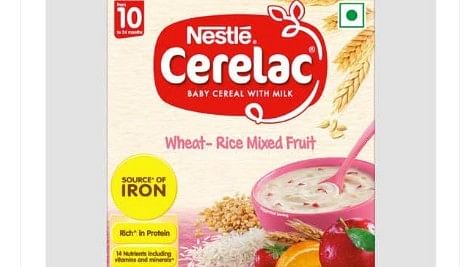
Cerelac, one of the most sold baby food in India by Nestle.
Credit: mynestle.in
New Delhi: Global consumer products giant Nestlé sells baby food product Cerelac with higher sugar content in India and other developing countries in Asia, Africa and Latin America as compared to markets in Europe, claimed a report by Swiss non-profits the Public Eye and the International Baby Food Action Network (IBFAN).
According to samples tested in a Belgian laboratory, Cerelac sold in India contains 2.7 grams of added sugar per serving on average. In other developing countries this added sugar content is even higher. Products sold in the Philippines reported to have added sugar content of 7.3 grams per serving, while in Thailand it stood at 6 grams.
The similar products sold in the UK, Germany, and other developed countries in Europe by the Switzerland-headquartered Nestlé - the world’s largest fast moving consumer goods (FMCG) company - contain no added sugar.
Shares of Nestle’s India subsidiary fell 3 per cent on the Bombay Stock Exchange on Thursday.
India’s food regulator Food Safety and Standards Authority of India (FSSAI) has initiated an inquiry into the matter. According to official sources, the findings will be placed before a scientific panel and a stringent action might be taken against Nestle if it is found to be at fault.
Reacting to the controversy, a Nestle India spokesperson said: “Compliance is an essential characteristic of Nestlé India and we will never compromise on that. We also ensure that our products manufactured in India are in full and strict compliance with standards and local specifications (as required) pertaining to the requirements of all nutrients including added sugars.”
“There is a double standard here that can’t be justified,” said Nigel Rollins, a scientist at WHO. These, he said, pose challenges both in terms of public health and ethics.
Rollins was quoted in the report released by the Swiss NGOs as saying that the companies may try to get children used to a certain level of sugar at a very early age so that they develop a liking for products with high levels of sugar.
Nestle India claimed that it has reduced sugar content in baby products over the years.
“Reduction of added sugars is a priority for Nestlé India. Over the past five years, we have already reduced added sugars by up to 30 per cent, depending on the variant. We regularly review our portfolio and continue to innovate and reformulate our products to further reduce the level of added sugars, without compromising on nutrition, quality, safety, and taste,” the company’s spokesperson said in an email statement to DH.
Nestlé controls around 20 per cent of the global baby-food market, valued at nearly $70 billion. With more than $2.5 billion in world sales in 2022, Cerelac and Nido are some of Nestlé’s best-selling baby-food brands in low- and middle-income countries.
In India, Nestlé dominates in several FMCG categories. Cerelac, marketed as a complementary food for babies from 6 to 24 months, controls around 97 per cent of the market.
Nestle has faced controversy earlier as well. In 2015, the company was forced to withdraw nearly 38,000 tonnes of Maggi noodles from retail shelves after a government test revealed the presence of MSG (monosodium glutamate) and lead in the instant noodles.